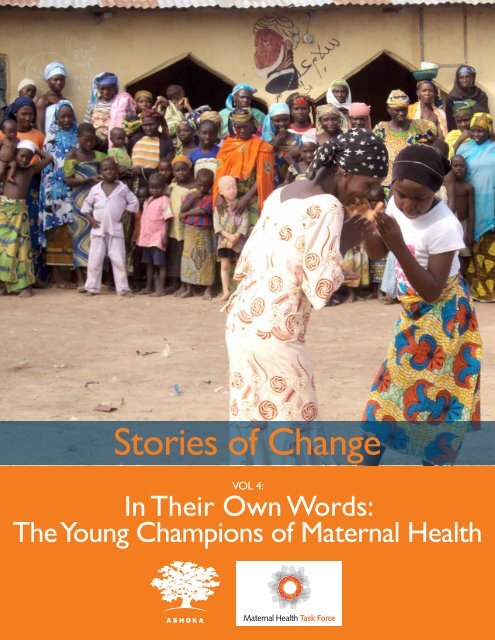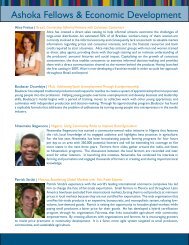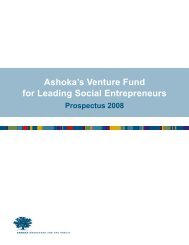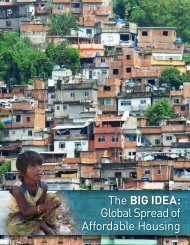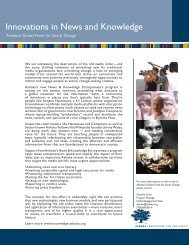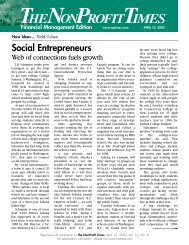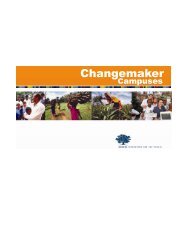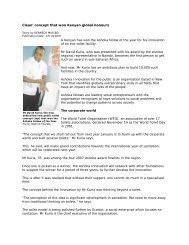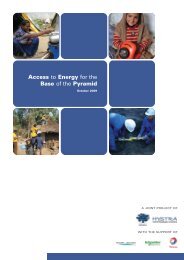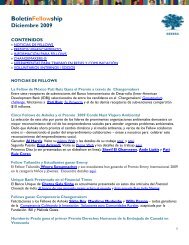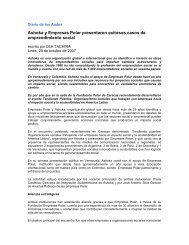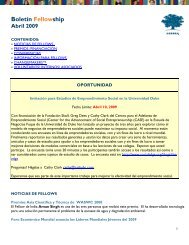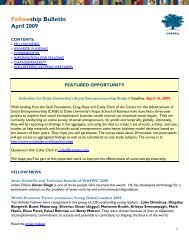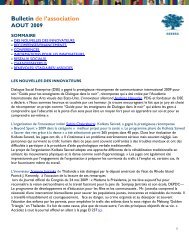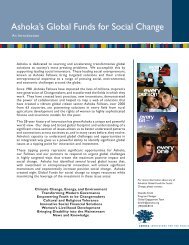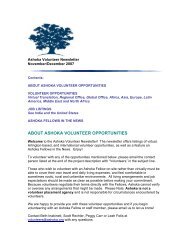You also want an ePaper? Increase the reach of your titles
YUMPU automatically turns print PDFs into web optimized ePapers that Google loves.
<strong>Stories</strong> <strong>of</strong> <strong>Change</strong><br />
VOL 4:<br />
In Their Own Words:<br />
The Young Champions <strong>of</strong> Maternal Health
“ Women are not dying because <strong>of</strong> diseases we cannot<br />
In Their Own Words<br />
treat…They are dying because societies have yet to<br />
make the decision that their lives are worth saving. ”<br />
– Mahmoud Fathalla, Chair <strong>of</strong> the WHO Advisory<br />
Committee on Health Research<br />
Every year, over 350,000 women die from complications related to childbirth or pregnancy. That’s 40<br />
mothers dying every hour, 99% <strong>of</strong> them in developing countries. Dying or becoming disabled during<br />
pregnancy or childbirth is both unnecessary and preventable, but health systems and resource allocations<br />
have yet to prioritize maternal health. Childbirth—an event which can inspire so much hope, should<br />
never be the cause <strong>of</strong> so much tragedy.<br />
In 2009, <strong>Ashoka</strong> and the Maternal Health Task Force (MHTF) at EngenderHealth joined forces to invest<br />
in the future <strong>of</strong> the maternal health movement. Since its founding in 1980, <strong>Ashoka</strong> has worked with<br />
over 3,000 leading social entrepreneurs to build communities <strong>of</strong> innovators who work together to<br />
transform societies and design new ways for the citizen sector to become more entrepreneurial,<br />
productive, and globally integrated. When it was launched in 2008, the MHTF established the Young<br />
Champions <strong>of</strong> Maternal Health program, and invited <strong>Ashoka</strong> to implement it. <strong>Ashoka</strong> and the MHTF<br />
agreed that a collaborative community <strong>of</strong> social entrepreneurs, dedicated to the proposition that<br />
no mother should suffer in pregnancy or childbirth, can deliver system-changing transformations<br />
to the maternal health field.<br />
The 15 Young Champions, selected through an <strong>Ashoka</strong> <strong>Change</strong>makers.com online competition and a<br />
rigorous interview process, represent a new cadre <strong>of</strong> young pr<strong>of</strong>essionals that can sustain the momentum<br />
to end the cycle <strong>of</strong> maternal death and disability. These Young Champions <strong>of</strong> Maternal Health were<br />
1
members <strong>of</strong> the first-ever international mentorship program to focus on supporting a new generation<br />
<strong>of</strong> global leaders dedicated to improving maternal health.<br />
The Young Champions hail from 12 countries, including India, Ethiopia, and Nigeria—countries with<br />
high maternal mortality—and come from extraordinarily diverse backgrounds: an Iranian midwife, an<br />
American banker, a Brazilian artist, and a Pakistani doctor to name just a few. Each <strong>of</strong> these Young<br />
Champions packed up their lives and moved to a new country for nine months to learn from an <strong>Ashoka</strong><br />
Fellow—men and women with proven track records in providing system-changing solutions that<br />
address the world’s most urgent social problems by developing, running, and sustaining effective social<br />
ventures.<br />
The Young Champions <strong>of</strong> Maternal Health represent a powerful new force to transform the field <strong>of</strong><br />
maternal health globally. In this <strong>Stories</strong> <strong>of</strong> <strong>Change</strong> eBook, the Young Champions share their journeys<br />
as evolving social entrepreneurs who will undoubtedly create systemic change in the maternal<br />
health field.<br />
GlOBAl MATERNAl MORTAlITY<br />
Deaths per 100,000 live births as reported in WHO (2010) Trends in Maternal Mortality 1990–2008.<br />
Table <strong>of</strong> Contents<br />
In Their Own Words .........................................1<br />
Anna Dion ..........................................................4<br />
Carolina Damásio ..............................................5<br />
Ifeyinwa Egwaoje ................................................6<br />
Fatemeh Ahmadi ................................................7<br />
Faisal Siraj ...........................................................8<br />
Hellen Mammeja Kotlolo ..................................9<br />
Julianne P. Weis .................................................10<br />
María laura Casalegno ....................................11<br />
Writers: Claire Bangser, Bruno Borges, Megan Coolidge, Duc luu, Tiffany Morris, and Tyler Spalding<br />
layout: Megan Coolidge and Rachel land<br />
Contributors: Tessa Farnsworth and Corrie Sutherland<br />
Attribution-Noncommercial-No Derivative Works<br />
Martha Fikre Adenew ......................................12<br />
Onikepe Oluwadamilola Owolabi ..................13<br />
Peris Wakesho ..................................................14<br />
Sara Al-lamki ...................................................15<br />
Seth Cochran ...................................................16<br />
Yeabsira T. Mehari ............................................17<br />
Zubaida Bai .......................................................18<br />
Transforming the Maternal Health Field .......19<br />
Connect with Us .............................................21
Anna Dion Canada<br />
In Canada, Anna is addressing the challenge <strong>of</strong> low-income women’s inability to access appropriate<br />
healthcare during pregnancy by training a critical mass <strong>of</strong> volunteer companions to support<br />
them through their reproductive health decisions. During her placement in Argentina with <strong>Ashoka</strong><br />
Argentina Fellow Alberto Vázquez, Anna developed an inter-disciplinary birthing companion program in<br />
partnership with the local Secretary <strong>of</strong> Health and Director <strong>of</strong> the High-Risk Maternal and Infant<br />
Health Unit. In May, Anna gave birth to a healthy baby boy and has begun her own journey as a mother.<br />
Here, she shares how her experience as a Young Champion has influenced her own perspective on<br />
solutions to maternal death and disability and how she will integrate her work in this field with her<br />
journey as a new mother.<br />
Through this program, I have strengthened my own belief in the model <strong>of</strong> filling the gap between medical<br />
and social services to improve the health and well-being <strong>of</strong> marginalized populations.<br />
Many <strong>of</strong> the women who I have worked with both in Canada and through my internship in Argentina<br />
would turn to the medical system for solutions to broader public health issues, such as food, housing,<br />
childcare, or social support programs. Despite these basic services being essential to building healthy<br />
families, this information is rarely in the hands <strong>of</strong> health pr<strong>of</strong>essionals. It is in bridging this gap that I<br />
hope to reduce the isolation and missed opportunities particularly for adolescent and minority women<br />
in Canada. I am confident in this model, but am now figuring out how to adapt it to the context <strong>of</strong><br />
supporting women who experience loss on their own journey towards motherhood, with some <strong>of</strong> the<br />
key tools <strong>of</strong> a critical eye, thorough analysis and bias towards action that push me forward. As I learn<br />
more about the field itself, a path through this forest slowly becomes clearer.<br />
I guess I could say the same thing about my journey towards parenting—that I have a general idea where<br />
I am headed and where I want to end up, but know that I cannot plan my path; understanding instead<br />
that I will end up discovering it along the way, hopefully gathering a couple <strong>of</strong> key skills along the way for<br />
good measure.<br />
4
Carolina Damásio Brazil<br />
Carolina has a new idea that channels compassion, creativity, and collaboration as forces for social<br />
change. In Brazil, she founded a citizen sector organization in an impoverished northeast region<br />
called The Art <strong>of</strong> Being Born which uses art as a tool to help mothers during pregnancy. In Mali, with<br />
guidance from the <strong>Ashoka</strong> West Africa representative Coumba Toure, she adapted her Art <strong>of</strong> Birthing<br />
model to the Malian context. Below, Carolina reflects on the surprises and challenges <strong>of</strong> working<br />
within a unique cultural context.<br />
While I´m thinking about the future, several girls in Mali become<br />
pregnant, are rejected by their families, must leave their villages, and<br />
have no idea what their future will be. When I decided to adapt the<br />
‘Art <strong>of</strong> Birthing’ to the Mali context, I decided that it would be replicated with teenagers, most <strong>of</strong> whom are<br />
experiencing unplanned pregnancies. But, I confess I had no idea how these girls are neglected!<br />
In a Muslim country full <strong>of</strong> traditions, a pregnancy without<br />
a marriage results in the girl’s isolation. Without any<br />
prospects for the future, and with no support in a location<br />
where it’s hard to survive, I spent my last weeks working to<br />
make sure the ‘innovative idea’ continues.<br />
In Koutiala, I met a group <strong>of</strong> pregnant girls between 13 and 18<br />
years old and I started teaching health with art, enabling them<br />
to appreciate the special time <strong>of</strong> pregnancy. At the end <strong>of</strong> the<br />
first meeting they were photographing the life and coloring<br />
their smiles.<br />
Before I was born,<br />
I was made <strong>of</strong> light<br />
Yes! I used to play with stars<br />
I used to travel around.<br />
I played around the sun<br />
And lay colors on the face <strong>of</strong> the moon<br />
One day, I came by this world<br />
And I saw<br />
so many people struggling<br />
And I said<br />
I want to bring some justice<br />
Remember! / long before I was born / I was made <strong>of</strong> light / And I used to play with the stars<br />
— Coumba Toure<br />
5
Ifeyinwa Egwaoje Madu niGEria<br />
Ifeyinwa has a deep belief in women’s empowerment and the ability <strong>of</strong> youth to contribute to building<br />
a new society. Prior to the Young Champions program, she helped build the Girls’ Power Initiative,<br />
an organization that encourages women to question gender roles within their own environments and<br />
become visible members <strong>of</strong> their communities. During her Young Champion’s placement, her skills<br />
and interests were easily transferred to the American context where she worked for Birthing Project<br />
USA under the direction <strong>of</strong> <strong>Ashoka</strong> U.S. Fellow Kathryn Hall-Trujillo. She became so inspired by her<br />
mentor’s model that she plans to replicate it in Nigeria. During her placement, Ify was struck by the<br />
stark differences between maternal health in the U.S. and Nigeria.<br />
I had to do some research on maternal health in Nigeria this January. The figures I came across are<br />
disheartening and shows the enormity <strong>of</strong> challenges that I am going back home to tackle after my nine<br />
month internship as a Young Champion. Nigeria is only 2% <strong>of</strong> the world’s population, yet accounts for<br />
10% <strong>of</strong> maternal deaths from childbirth. Nigeria ranks second to India globally in number <strong>of</strong> maternal<br />
deaths and for every woman who dies from childbirth, another 30 suffer from long-term ill health.<br />
In the last week, I have had to compare the United States’ maternal health system with the one we have<br />
in Nigeria. The gap is huge. Here in the United States there are well-equipped health facilities that have<br />
been made accessible through the Medicaid program to women who ordinarily would not have been able<br />
to afford it. But back home my sisters, cousins, neighbors, and friends die on a regular basis because <strong>of</strong> a<br />
lack <strong>of</strong> access to skilled health care during pregnancy and childbirth.<br />
With the realization that at the end <strong>of</strong> today 144 women will have died from childbirth in Nigeria, I have<br />
resolved this year to do everything within my means as a woman, as a Nigerian, and as a Young Champion<br />
to bring my idea <strong>of</strong> providing prenatal home-based care to Nigerian women to reality. I might seem like<br />
a lone voice, but I know that if I cry long enough and loud enough, change will definitely come someday<br />
for my Nigerian sisters.<br />
6
Fatemeh Ahmadi iran<br />
Fatemeh’s life was transformed when, as a young girl, she accompanied her mother to a midwifery<br />
clinic and realized that midwifery could pr<strong>of</strong>oundly impact the poor treatment <strong>of</strong> women in Iran.<br />
She has developed a three-pronged approach to women’s health literacy based on Paulo Freire’s<br />
educational model. During her Young Champions placement, Fatemeh was surprised at the lack <strong>of</strong><br />
general health education. As a result, she implemented her approach to teach local health workers<br />
under the guidance <strong>of</strong> <strong>Ashoka</strong> Uganda Fellow Rita Sembuya and Dr. Jane Vella. Here, Fatemeh<br />
expresses how working in Uganda has shifted her outlook on teaching maternal health.<br />
I remember the advice <strong>of</strong> my pr<strong>of</strong>essor, Dr. Golnar Mehran at Al-Zahra University, when she said<br />
goodbye to me. She said, “Wash your eyes and look in another way; in this way you will learn many<br />
things from Uganda.”<br />
It is the second time that I can feel changes happening inside me. The first time was when I entered<br />
Alzahra University to study educational psychology. The second time began when I was selected as a<br />
Young Champion to work with Joyce Fertility Support Centre in Uganda.<br />
It has now been one month since coming to Uganda and starting to work at the Joyce Fertility Support<br />
Centre. I see how this very small <strong>of</strong>fice with sparse facilities is capable <strong>of</strong> doing big jobs and I am happy<br />
to be here.<br />
Rita has paved the way for me to visit some organizations and evaluate their work according to how<br />
they educate women in maternal health. These visits have helped me improve my evaluation skills and<br />
see with my own eyes how the traditional model <strong>of</strong> education is unfortunately dominant in the maternal<br />
health field.<br />
I know that if we are going to educate women according to our project there is a need to connect the<br />
educational content to their context.<br />
7
Faisal Siraj Pakistan<br />
A<br />
medical doctor in Pakistan, Faisal is changing the maternal health field in his country by tapping<br />
into a poorly-utilized resource: medical interns. Faisal has a history <strong>of</strong> establishing entrepreneurial<br />
health efforts in both clinical and community settings in Pakistan and Kashmir and is an impassioned<br />
speaker about health systems reform. In the excerpt below, Faisal expresses his initial reactions to<br />
finally arriving in Nigeria—where he would spend the next few months working with <strong>Ashoka</strong> Nigeria<br />
Fellow lucy Attah Auwalu to map the skills <strong>of</strong> Traditional Birth Attendant (TBA) associations.<br />
Sometimes people really do not know what their destination is. What are we in this world for and<br />
how are we going to achieve what we desire? lost somewhere deep in my thoughts, looking at the<br />
golden floor <strong>of</strong> clouds, all <strong>of</strong>f a sudden the captain made this announcement, “We are landing at lagos<br />
airport in ten minutes.” A little smile danced on my lips and I told myself, “At last you made it!”<br />
My first day at the <strong>of</strong>fice was really memorable because a lot <strong>of</strong> people were there to greet me. I came<br />
to understand they were eagerly waiting for their Oyeboo (what they call me, meaning “White Man”).<br />
I had to visit every station as everyone was waiting for their Oyeboo. That was the best feeling I have<br />
ever had in my entire life!<br />
We decided we are going to start community awareness sessions on a daily basis. I cannot express<br />
how it feels when you start knowing new people and communities. During the awareness session we<br />
actively involve the pregnant women in the discussion and we talk about a healthy diet during pregnancy,<br />
importance <strong>of</strong> cleanliness, sexually transmitted infections, HIV, importance <strong>of</strong> HIV screening in pregnancy,<br />
Tuberculosis (TB), Malaria, and family planning. I am happy that the communities are taking interest<br />
in discussions regarding the issues and that they are very friendly and open about these issues.<br />
8
Hellen Mammeja Kotlolo south afriCa<br />
Hellen’s passion for helping those less fortunate and her ability to “think big” has led her to not<br />
only become the dedicated maternal health pr<strong>of</strong>essional that she is today, but also a leader in the<br />
maternal health field in South Africa. Hellen has identified the lack <strong>of</strong> coordination and communication<br />
between hospitals, clinics, pharmacies, NGOs, community health centers, and pregnant women as key<br />
barriers to maternal health referrals and record keeping in and around Johannesburg. During her<br />
mentorship, Hellen worked with <strong>Ashoka</strong> India Fellow Indu Capoor to further explore this connection<br />
by developing a concept for the use <strong>of</strong> mobile technology in pregnancy prevention. After attending<br />
the Young Champions Future Forum in Ghana, Hellen reflected on the role <strong>of</strong> history in her own life<br />
and the maternal health field.<br />
On the last day in Ghana, a few Young Champions and I visited Elmina Castle at the Cape coast <strong>of</strong><br />
Ghana—a place where slaves used to be captured and kept before being shipped <strong>of</strong>f to different<br />
parts <strong>of</strong> the world like America. Who knew how many emotions this place would expose for a young<br />
African woman who herself has lived during apartheid? This is a history not so far forgotten in the<br />
southern tip <strong>of</strong> Africa.<br />
Being at Elmina was emotional yet I realized that during our time in the 21st century there are<br />
still forms <strong>of</strong> inequalities that happen in our midst. The death <strong>of</strong> women and children is a human<br />
rights issue.<br />
History teaches us a lot about suffering and the evolution from slavery to freedom. A hospital taught<br />
us that it is possible to reduce unnecessary deaths and find ways to motivate hardworking staff in<br />
one <strong>of</strong> the busiest hospitals in Ghana. Our mentors taught us that there are challenges, but that the<br />
dream lives on and that those challenges will build us to become even better champions. I learn more<br />
each day about the possibilities because tomorrow started yesterday.<br />
9
Julianne P. Weis usa<br />
As a public health master’s student and later, as a project coordinator at a hospital in Niger, Julianne<br />
saw an opportunity to improve post-operative training for women suffering from obstetric fistula.<br />
Julianne proposed expanding healthcare workers’ roles to conduct non-compulsory, comprehensive<br />
trainings on fistula prevention for post-operative fistula survivors. During her Young Champion’s<br />
placement, Julianne worked with <strong>Ashoka</strong> Brazil Fellow Raquel da Silva Barros’ organization, lua<br />
Nova. While at lua Nova, Julianne applied her skills to improve another area <strong>of</strong> maternal health:<br />
rehabilitation for young mothers. Motivated by her desire to improve the health <strong>of</strong> these young<br />
mothers, Julianne developed a comic book about safe motherhood and a book detailing therapeutic<br />
activities for new mothers. Below, she describes an emotional exercise she conducted with the<br />
young women at lua Nova.<br />
I was in front <strong>of</strong> the group holding a closed shoe-box, explaining to the participants: “Think <strong>of</strong> the<br />
most important person in your lives. A person who deserves all your care, whom you truly love and<br />
know most intimately… Think <strong>of</strong> this person and what their feelings, motivations, and dreams are…”<br />
As they sat thinking, I told them they would then meet this person face-to-face, inside this very shoebox!<br />
I had each girl come up to the front <strong>of</strong> the room and open the box, seeing a mirror inside. Shock<br />
registered on their faces as they realized that it was they themselves who deserve all care and love<br />
imaginable! They had worthy motivations and dreams that must be respected! The girls began to cry, and<br />
most could only glance in the mirror for a moment before looking away, too startled to see themselves<br />
in such a light.<br />
It was a breakthrough moment for all <strong>of</strong> them to have someone actually say to them: you have<br />
worth. And so this last week, with a whole team <strong>of</strong> pr<strong>of</strong>essionals pampering and photographing<br />
them and their children, the girls were moved and appreciative. It was a culmination <strong>of</strong> this whole<br />
course which turns the attention on the potential <strong>of</strong> these young women to erase the hardened<br />
abuse they have previously been privy to, and to cultivate their innumerable qualities and skills.<br />
10
María laura Casalegno arGEntina<br />
María laura believes that the ability <strong>of</strong> every woman to access an early gynecologic and obstetric<br />
consultation can reduce the risk factors that may affect the normal evolution <strong>of</strong> pregnancy. She<br />
plans to address the lack <strong>of</strong> access to maternal health care in remote areas <strong>of</strong> Argentina by creating<br />
a system <strong>of</strong> mobile health clinics that are coordinated by health agents to provide early pregnancy<br />
screenings. During her Young Champions placement, laura worked on the Obstetric First Responder<br />
Project with <strong>Ashoka</strong> Mexico Fellow Dr. Haywood Hall. This project provides training workshops to<br />
midwives, doulas, health workers, and communities in rural areas to teach them how to detect early<br />
signs and symptoms <strong>of</strong> obstetric emergencies. During one month <strong>of</strong> her placement, laura traveled<br />
to both Guatemala and the U.S. In this excerpt, she notes the stark cultural and maternal health<br />
differences between the two countries.<br />
We live in a fascinating world, with so many cultures, so many landscapes, so many realities… sometimes<br />
these different realities can be very unfair…that’s why I think that we live in a world <strong>of</strong> contrasts…<br />
In Guatemala I met Connie Vanderhyden, Jeri Pearson and her husband Marty Pearson, and Kim Dowat.<br />
Connie and Jeri are part <strong>of</strong> the organization Kickapoo Guatemalan Accompaniment Project (KGAP) and<br />
they have been working in Chacula community for over seventeen years. The goal <strong>of</strong> the KGA Project<br />
is to work with ex-refugees from the Guatemalan Civil War to develop strategies and tools to improve<br />
education and health in the community.<br />
After my visit to Guatemala, I traveled to Kansas City, Missouri. I attended an international Advanced life<br />
Support in Obstetrics (AlSO) board meeting with Dr. Hall. There were three days <strong>of</strong> intense work and it<br />
was great to see how the AlSO program is being developed in other countries.<br />
I went from the warm and sunny Guatemalan weather to the cold and cloudy winter in the U.S. I went<br />
from the land <strong>of</strong> mountains and volcanoes to the land <strong>of</strong> plain fields. I saw people growing c<strong>of</strong>fee and beans<br />
and people raising cows. I saw people living in the worst conditions and people who have all their basic<br />
needs satisfied and more…<br />
It is really difficult to understand how, still now, we have these unfair differences…how can the world be<br />
so indifferent to all this… how can the world be so… contrasting…<br />
11
Martha Fikre Adenew EthioPia<br />
Across Ethiopia, some 22,000 women died in 2005 due to causes “related to or aggravated by<br />
pregnancy or its management” (as reported by the WHO, UNICEF, UNFPA, and the World Bank).<br />
Martha believes that women must feel empowered to solve their own problems if these figures are to<br />
decrease and maternal health solutions are to become sustainable. Prior to her placement as a Young<br />
Champion, Martha began developing maternal health clubs in rural areas that focused on building<br />
networks <strong>of</strong> female educators to devise community-based solutions to women’s health. Due to the<br />
influence <strong>of</strong> her Young Champion program mentor, <strong>Ashoka</strong> U.S. Fellow Kathryn Hall-Trujillo, Martha’s<br />
idea has developed even further to more strongly involve the community’s insights to identify and<br />
solve their own problems, rather than rely on external solutions. After her nine month placement<br />
in the United States, she now returns to Ethiopia with a plan to create a platform where women<br />
can support one another, bring important health services into the home, and prepare themselves<br />
financially to give birth in a health facility.<br />
When I was in Ethiopia I was working in different public health fields including maternal health, which<br />
clued me in on how severe the maternal health problem is. As a health care provider I see firsthand<br />
mothers dying and suffering from child birth. It has always broken my heart. Even though I had a deep<br />
desire to change the situation, I had no idea how to do it and bring about change as an individual.<br />
Specifically, working with Kathryn’s organization, Birthing Project USA, helped me understand different<br />
strategies <strong>of</strong> how women can help each other and solve their own problems in a very cost effective way.<br />
There are uncertainties. But, one thing I am sure <strong>of</strong> is that I am going to put all my efforts into improving<br />
maternal health by implementing my idea and working with others. My completion <strong>of</strong> my journey<br />
as a Young Champion is as if a chapter <strong>of</strong> a book has been read, but the entire book still remains.<br />
12
Onikepe Oluwadamilola Owolabi niGEria<br />
Onikepe is a passionate young doctor interested in improving access to maternal care in rural<br />
areas. In Nigeria, she is creating a maternal health training program for doctors undertaking the<br />
country’s National Service Year (NSY) requirement. During her placement as a Young Champion with<br />
<strong>Ashoka</strong> India Fellow Arminda Fernandez at the Society for Nutrition, Education, and Health Action<br />
(SNEHA), Onikepe assisted the organization in developing a sustainability plan and secured funding<br />
for SNEHA to enhance outreach <strong>of</strong> maternal health to slums. In the following excerpt, Onikepe sadly<br />
reminds us that preventable maternal deaths can happen to those closest to us.<br />
I walked into my cousin’s house at 11pm in the suburbs <strong>of</strong> london, relieved to be inside a warm place<br />
after 2 hours <strong>of</strong> traveling. It was my eighth day away from work in Mumbai, and all my days had been spent<br />
in a specialist hospital on the outskirts <strong>of</strong> london caring for family. Indeed, I hardly had any time to think<br />
<strong>of</strong> the community resource centers in the slums <strong>of</strong> Mumbai or the data I was collecting. All my energy<br />
and attention was focused on something different.<br />
As I slumped into the s<strong>of</strong>a exhausted from three hours <strong>of</strong> traveling home, my cousin’s first statement<br />
was “our cousin died yesterday you know.” She then proceeded to tell me about one <strong>of</strong> our other<br />
relatives who died in childbirth. With her limited medical knowledge, she felt the case had been<br />
mismanaged, and she related the details to me, eventually calling up the deceased’s sister-in-law to<br />
clarify the unclear details. I switched into my doctor role, asking as many questions as I could to create<br />
a clear picture, and sadly her hunch turned out to be right; it was an extremely avoidable maternal<br />
death, one which took place in the city where facilities are available and whose victim was an educated<br />
member <strong>of</strong> a middle class family.<br />
Two weeks before this, I heard that a senior colleague <strong>of</strong> mine from medical school had also died in<br />
childbirth, from some <strong>of</strong> her outraged friends who were trying to investigate what appeared to have<br />
been a poorly managed case. As I tried to quell my cousin’s anger for the rest <strong>of</strong> that night, I mulled over<br />
these two incidents. It really hurt to think that two people whom I was somehow connected to died for<br />
reasons that can be prevented. My concluding and very simple thought before I slept was that there is<br />
still a lot <strong>of</strong> work for me to do.<br />
13
Peris Wakesho kEnya<br />
Peris recognizes that talking about early motherhood, accessing antenatal and post-natal care,<br />
and adjusting after a maternal morbidity is very difficult for adolescents. She is addressing this<br />
challenge by starting “Swahiba Clubs”—psychological support groups that provide privacy and a safe<br />
space for adolescent mothers and fathers to address their sexuality, relationships, health needs, and<br />
motherhood with other adolescent parents. During her Young Champions placement working with<br />
<strong>Ashoka</strong> Nigeria Fellow Dorothy Aken’ova, Peris was inspired by Niger state’s women day care school<br />
system where adolescent mothers go to a separate school with other mothers to complete their<br />
education. As she returns home to Kenya, Peris will introduce this system to government leaders<br />
and civil society organizations to prevent pregnant adolescents from dropping out <strong>of</strong> school while<br />
increasing their access to reproductive health services and support networks to address maternal<br />
morbidity. In the following excerpt, Peris expresses her persistence as a young social entrepreneur.<br />
At exactly three minutes past 3pm, on my way back to INCRESE (the organization where I am based),<br />
just before I turned the last corner, the motorbike driver lost control and we fell to the ground! As<br />
I jumped, just before the motorbike hit the ground and fell on my other foot, I shook <strong>of</strong>f the dust<br />
from my hands and feet, asked the motorbike driver if he was okay, paid him his money and walked<br />
to INCRESE Youth Center. I thought to myself, “This is part <strong>of</strong> the experience when working in<br />
communities; not just sharing their food, air, water, and empathizing with them, but also experiencing<br />
some <strong>of</strong> the challenges first hand.”<br />
The beauty <strong>of</strong> this experience is that it reaffirms how even as I wind up my Young Champions program,<br />
which marks the beginning <strong>of</strong> my long journey as a social entrepreneur aiming to influence others to<br />
be changemakers in the maternal health field, some things are apparent: I have fears <strong>of</strong> how well I will<br />
be able to implement my project. Will the community see its viability and want to be part <strong>of</strong> it? How<br />
many adolescents’ lives will I impact positively? Will I fall? And if I fall, which might happen, just like<br />
what happened when I fell from the motorbike, I will have to gracefully stand up, see that the team<br />
I work with is okay and ready to continue, brush <strong>of</strong>f the dust, and move forward because this is the<br />
only way that I will make a positive difference. It is not just about the falling, but what I do thereafter.<br />
14
Sara Al-lamki oman<br />
Sara Al-lamki’s parents fled Zanzibar during the revolution in which Sara’s grandfather was killed<br />
and they became refugees in Ireland and Egypt for years before returning to their ancestral Oman.<br />
These family experiences informed Sara’s social consciousness. Sara is now focused on reducing<br />
maternal mortality rates in the Arab world by training midwives in rural areas to perform the duties<br />
<strong>of</strong> nurses in city clinics. During her placement with <strong>Ashoka</strong> Indonesia Fellow luh Putu Upadisari, Sara<br />
interviewed Indonesian women to examine their economic background, access to information, and<br />
knowledge about maternal and reproductive health. The following excerpt details her experience in<br />
Indonesia just before the end <strong>of</strong> the Young Champions program.<br />
The countdown to the end <strong>of</strong> the Young Champions (YC) program looms ever closer, and the future is<br />
daunting and exciting all at once. We have all just returned from another inspiring YC meeting, this time<br />
in Accra, where we exchanged ideas, experiences, challenges, and our journey <strong>of</strong> figuring out the next<br />
phases in our lives. It was the perfect way to end our placement—with as much inspiration and vigor to<br />
change the world as we started, forgetting all the hardships we’ve endured, and finding solace in each<br />
others’ experiences. Still it is not quite over yet, and I’m trying to squeeze the very most out <strong>of</strong> the<br />
final 3 weeks left in Bali, and making sure that all loose ends are tied so I can leave knowing that I left a<br />
footprint, no matter how small.<br />
For me, it was also a month <strong>of</strong> triumph—15 weeks and 156 interviews later—I was done with my<br />
pregnancy habits and maternal health status survey. Dr. Fred Sai ended our Accra meetings with telling<br />
us to start slow, and to begin with just “lighting up your corner.” I’m still a long way away <strong>of</strong> course. I still<br />
have to analyze the data and figure out what it all means, but it’s been a great ride, and the preliminary<br />
results are very promising. Just another reminder that my time in Bali is truly running out, but hopefully<br />
that my little contribution has begun to light up my little corner, and I can expand it to wherever my<br />
journeys take me next. It may take a while to light up the whole room, but I think I’m on the right track.<br />
15
Seth Cochran usa<br />
A<br />
former consultant and a serial social entrepreneur, Seth conducted research in Africa in 2008<br />
to attempt to understand the challenges local organizations face while treating obstetric fistula.<br />
Moved by his passion for creating solutions to social problems and taking advantage <strong>of</strong> his strong<br />
business background, Seth founded OperationOF to empower society’s most marginalized members<br />
to make motherhood safer. During the Young Champions Program, Seth worked with <strong>Ashoka</strong> Spain<br />
Fellow Andrés Martínez Fernández to apply appropriate information and communication technologies<br />
to improve primary healthcare systems. Here, Seth explains how he applied skills he developed in<br />
private equity to improve remote healthcare delivery in Spain and Peru.<br />
like most engineers, I spent my youth either taking household electronics apart or playing with legos. Both<br />
activities exhibit a fascination with the simple pieces that make up more complex objects. Surrounded<br />
by circuit boards, I no longer possess the desire to destroy a radio in search <strong>of</strong> understanding its<br />
components. In a former life as a finance guy, I let my inner nerd trade in the bucket <strong>of</strong> legos for an Excel<br />
model with complicated formulas and every costing function you can imagine holding it together.<br />
These kinds <strong>of</strong> models helped me evaluate creative ways to finance projects when I managed a $160<br />
million budget in my former finance life. So when Andrés handed me a booklet on financing structures for<br />
social businesses and asked me to start working on a capital structure strategy to support EHAS growth,<br />
another part <strong>of</strong> my old self came out <strong>of</strong> hibernation.<br />
This month has required me to dust <strong>of</strong>f lots <strong>of</strong> my old private sector skills. Funny thing is that applying<br />
these skills to extend healthcare to people in need is much more exciting than making anonymous<br />
shareholders richer.<br />
16
Yeabsira T. Mehari EthioPia<br />
You could have been one <strong>of</strong> those many girls married <strong>of</strong>f at 13,” Yeabsira’s father once said.<br />
Mothers that suffer from fistula, a condition that <strong>of</strong>ten causes a foul stench, which, in Ethiopia,<br />
is a cause for segregating mothers from the rest <strong>of</strong> society, are <strong>of</strong>ten young. Since then, Yeabsira<br />
has been passionate about improving women’s health in Ethiopia. She plans to develop a fistula<br />
health center in the country that will address both the negative economic and the socio-cultural<br />
effects <strong>of</strong> fistula through a three-year residential training program. In the meantime, she will work in<br />
India, her Young Champions placement country to launch a peer-to-peer health education program<br />
which incorporates obstetric fistula awareness. Below, Yeabsira explains how working at the ASHA<br />
Foundation with her mentor, <strong>Ashoka</strong> Fellow Glory Alexander, exposed her to the necessity <strong>of</strong><br />
educating women in order to successfully put an end to maternal death and disability.<br />
Initially, my aim to take part in ending obstetric fistula was the main push behind all my work. Then,<br />
I moved to India and started working in a different field than obstetric fistula: HIV/AIDS. Though<br />
HIV/AIDS and obstetric fistula don’t have much in common, they do share certain traits that have a<br />
massive impact on the women who suffer from these ailments.<br />
Aside from the physical effects, HIV/AIDS and obstetric fistula patients suffer from psychosocial damage<br />
and face being ostracized by their communities. Education on what the ailment is, how it happens, and<br />
why it happens is lacking for both. Most believe both conditions are caused by an evil spirit, or by the<br />
woman being deemed unfit for motherhood by a higher power. Sitting through counseling sessions at<br />
ASHA, I was amazed to see how many women blamed themselves for bringing such a disease to their<br />
family — even though, eight out <strong>of</strong> ten times, it was actually the father’s infidelities that put them at risk.<br />
In a country where the act <strong>of</strong> sex or even discussing sex is a taboo, working in the field <strong>of</strong> maternal health<br />
is difficult. So it was in India that I learned the importance <strong>of</strong> knowledge. The force behind my work<br />
slightly shifted to… education.<br />
17
Zubaida Bai india<br />
Having once been one <strong>of</strong> the “silent victims” with whom she now works: a woman who, as a result<br />
<strong>of</strong> unsanitary birthing conditions and practices, contracted an infection that caused her to suffer<br />
for years, Zubaida Bai used her passion and experience in the social development sector to found<br />
AYZH, a social enterprise aimed at bringing technology solutions to rural women. During her Young<br />
Champions placement, Zubaida worked with <strong>Ashoka</strong> U.S. Fellow Rebecca Onie and her organization<br />
Health leads to analyze their Screening and Referral System <strong>of</strong> all 7 <strong>of</strong> their locations and map out<br />
trends for them to think about in order to develop a customized screening and referral tool which is<br />
tailor-made for each Health leads location. Zubaida is now collaborating with other Young Champions<br />
to promote and sell her sleek clean birth kits around the world—hoping to generate pr<strong>of</strong>it for the<br />
maternal health field. Here, she recounts her journey during her placement as a Young Champion.<br />
I’ve <strong>of</strong>ten felt that God has given me wheels for legs because my family’s life has been a constant ride.<br />
We have been up and down hills, crossed lots <strong>of</strong> bridges (most <strong>of</strong> which have been wobbly), but the<br />
Almighty always ensures we come out unscathed.<br />
When I started on this trip nine months ago with my extended <strong>Ashoka</strong> and MHTF family, I had a lot<br />
<strong>of</strong> fear and apprehension and wondered if this was the right decision for me, AYZH, and my family.<br />
Today, I look back at the best nine months I could have spent in my personal and pr<strong>of</strong>essional career.<br />
The nine months were filled with regularly scheduled travels and innumerable cups <strong>of</strong> c<strong>of</strong>fees with people<br />
in the field <strong>of</strong> women’s health. Reflecting on what made these nine months fruitful, I realized there is not<br />
one answer. Each meeting gave me something new to add to my knowledge. Some meetings pushed me<br />
to think harder, better, broader; others helped me feel refreshed and stronger, and some made me think<br />
about more innovative thoughts and ideas.<br />
The bottom line is that during this program nothing has changed but my mindset. I discovered that when<br />
I listen to people talking about the same subject I am passionate about and having people pay close<br />
attention to my words when I speak does wonders to my confidence. It made me fearless and I think it<br />
made all <strong>of</strong> us fearless to see there were others who understood and shared our passion.<br />
18
Transforming the Maternal Health Field<br />
“ There is no better investment than<br />
safeguarding the lives <strong>of</strong> mothers. ”<br />
– Ban Ki Moon, UN Secretary General<br />
A year ago, fifteen complete strangers in 12 different countries independently packed their lives into<br />
suitcases. They packed dress clothes and swimsuits, t-shirts and traditional items from home, flip flops,<br />
high-heels, laptops, books, and photos <strong>of</strong> loved ones. They said goodbye to their friends, parents, teachers,<br />
bosses, peers, siblings, and even their own children to jet <strong>of</strong>f to a new country, a new home, a new job,<br />
and a completely foreign way <strong>of</strong> living for the nine months to follow.<br />
The common thread between these fifteen perfect strangers was an unrelenting passion to transform the<br />
lives—and specifically the health—<strong>of</strong> women and mothers.<br />
Each <strong>of</strong> them proposed a new solution to improve the maternal health field and each <strong>of</strong> them was<br />
selected by <strong>Ashoka</strong>, the Maternal Health Task Force, and a panel <strong>of</strong> expert judges to become a Young<br />
Champion <strong>of</strong> Maternal Health.<br />
In the first and second trimesters <strong>of</strong> the Young Champions <strong>of</strong> Maternal Health Program (September<br />
1 through February 28), the Young Champions went through a wide range <strong>of</strong> experiences and growth<br />
pains—learning to apply their previous knowledge and experiences to address a maternal health issue in<br />
an entirely new context. They worked closely with their host organizations and <strong>Ashoka</strong> Fellow mentors<br />
to design projects and programs that would unite the institution’s existing solutions with the Young<br />
Champion’s unique perspective and insights. At the same time, the Young Champions found themselves<br />
deeply entrenched in the successes and struggles <strong>of</strong> social ventures on the ground.<br />
19
There is no doubt that each and every Young Champion faced immense challenges during this time. The<br />
combination <strong>of</strong> working in a different country (and <strong>of</strong>ten in a foreign language) far from family, friends,<br />
and familiarity; a different cultural context with its own traditions, norms, and obstacles; and a new<br />
host organization with foreign processes and unique challenges to address the sobering issues around<br />
maternal death and disability, was taxing and extremely difficult. During the hard times, Young Champions<br />
connected with one another. They shared their struggles, frustrations, fears, ideas, and successes. They<br />
inspired each other to persevere and challenged each other’s perspectives and approaches.<br />
In the ninth month, the Young Champions packed their suitcases once again. This time, they convened<br />
in Accra, Ghana, a hub <strong>of</strong> maternal health innovation in West Africa, for the Young Champions Future<br />
Forum. The three-day gathering brought the Young Champions group together with leading social<br />
entrepreneurs (including four <strong>Ashoka</strong> Fellows) and high-level maternal health experts (including<br />
Dr. Fred Sai) from Africa and the U.S. Over the course <strong>of</strong> three days, the Young Champions group<br />
received targeted guidance and social entrepreneurship skills training to help them put their<br />
maternal health ideas to action. They shared maternal health and social entrepreneurial knowledge,<br />
strengthened their pr<strong>of</strong>essional networks, and inspired one another to sustain the momentum that the<br />
YCMH program has built.<br />
The constant sharing <strong>of</strong> field-specific knowledge, experiential wisdom, new hopes, goals, and innovative ideas,<br />
ultimately birthed significant new collaborations. One creation resulting from this gathering is the Maternal<br />
Health Innovation Fund (MHIF) which will be founded by Young Champion, Seth Cochran. The fund will<br />
raise an initial $150,000 to provide seed capital to high caliber social entrepreneurs focusing on maternal<br />
health. During the Future Forum, the Young Champions recognized that bringing passionate local people<br />
with cultural context together with young innovators in the global north can lead to powerful collaborations<br />
which yield maternal health solutions that reach the people who need them most. While these innovators<br />
have creative solutions to solve maternal death and disability, large foundations do not have the capacity<br />
to administer and manage small seed grants. The MHIF will fill this role by having a board <strong>of</strong> maternal<br />
health and social entrepreneur experts select promising young maternal health innovators and provide<br />
seed-funding for their start-up social ventures.<br />
In addition to the MHIF, another collaboration which came out <strong>of</strong> the gathering was the idea to generate<br />
pr<strong>of</strong>it for the maternal health field by selling Young Champion Zubaida Bai’s clean birth kits. Zubaida’s clean<br />
birth kits are unique because they are compact and stylish and as a result, women use them as purses. After a<br />
conversation at the Future Forum, <strong>Ashoka</strong> Fellow Kathryn Hall-Trujillo decided to buy Zubaida’s clean birth<br />
kits in bulk and then re-sell them to generate pr<strong>of</strong>it for her own organization—this partnership will help<br />
sustain both Zubaida and Kathryn’s organizations, enabling them to better serve the women with whom they<br />
work. Zubaida is now partnering with other Young Champions and members <strong>of</strong> the maternal health field<br />
to sell her clean birth kits. The Maternal Health Innovation Fund and the birth kits are just two examples<br />
<strong>of</strong> collaborations which resulted from this gathering—there will certainly be many more collaborations as<br />
the Young Champions community continues to work together over the coming years.<br />
The Young Champions have now returned home with a suitcase <strong>of</strong> new set <strong>of</strong> tools, ideas, and skills<br />
packed in with their souvenirs. Though the nine-month program <strong>of</strong>ficially ended, there is no doubt this<br />
group will give birth to real change in maternal health for years to come.<br />
20
ABOUT ASHOKA<br />
Connect with Us<br />
THE MATERNAl HEAlTH TASK FORCE<br />
The Maternal Health Task Force (MHTF) at EngenderHealth contributes to shaping collective efforts to<br />
improve maternal health worldwide. Recognizing that real progress requires better coordination and<br />
increased global attention, the MHTF brings together existing maternal health networks and engages new<br />
organizations by identifying innovation, fostering dialogue, building consensus, and sharing information.<br />
CHANGEMAKERS.COM<br />
<strong>Change</strong>makers is <strong>Ashoka</strong>’s community <strong>of</strong> changemakers, a platform for those wishing to make a<br />
difference and the organizations that wish to engage with them. <strong>Change</strong>makers open-sources social<br />
change ideas by hosting competitions and conversations that matter.<br />
ASHOKA IS SOCIAl!<br />
<strong>Change</strong> Insight Blog http://www.ashoka.org/changeinsight<br />
Twitter http://www.twitter.com/ashokatweets<br />
Facebook http://bit.ly/<strong>Ashoka</strong>FB<br />
linkedIN http://bit.ly/<strong>Ashoka</strong>lI<br />
YouTube http://www.youtube.com/ashokavideos<br />
<strong>Ashoka</strong> was founded on the belief the social entrepreneurs are the most powerful force for changing<br />
the world. Our investment in leading entrepreneurs is deliberate—we support the best innovators,<br />
who we believe will achieve the greatest impact for systemic social change. These entrepreneurs<br />
also serve as role-models and facilitators for the next generation <strong>of</strong> social leaders, building an<br />
Everyone A <strong>Change</strong>makers world.<br />
We believe that the synergy between a passionate “who,” an innovative “what,” a sustainable “how,” and<br />
a community <strong>of</strong> changemakers can and will change the world.<br />
21
“[I]t is <strong>of</strong>ten said that young people are our future.<br />
They are our present, too. It is today, and not tomorrow, that we<br />
must invest in young people and include them in solving<br />
the great challenges <strong>of</strong> our times…”<br />
—Thoraya Obaid, Executive Director,<br />
The United Nations Population Fund (UNFPA)


